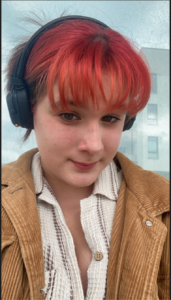It is impossible to understand the impact the current Russian aggression will have on Ukrainian society without taking into account the scars left by the Holodomor, World War 2, and Chornobyl
The full-scale invasion has undeniably affected every person within and outside of Ukraine’s borders. It is yet another massive historical event on the territory of modern Ukraine and it has already left its mark. But the transgenerational trauma within Ukrainian people runs far deeper than the current events and to understand the influence of the current events, we have to analyse previous experiences.
If you are not familiar with the term “transgenerational trauma” or “intergenerational trauma” it is a psychological term used to describe the consequences of a shared experience within families that affect further relationships within generations. For example, if a parent has suffered physical or mental abuse in the past and has not healed from that, but developed a coping mechanism like “shutting off” it most commonly affects the ability to teach their child the skills to communicate their feelings. Leading to another layer of trauma that will be passed on.
On a larger scale, intergenerational trauma is developed after major historical events, for example, World War 2, which creates a traumatic memory for the whole country or even a generation.
I spoke with Lidiia Kasyanchuk, a mental health and psychosocial support consultant from Ukraine now residing in Sweden who is working in the sphere of public health and emergencies about how Ukraine and its people were affected throughout its history.
Ukrainians have lived through an immense amount of traumatic historical events, such as Holodomor, WW2, and the Chornobyl disaster. Today, they are living through another huge crisis, the Russo-Ukrainian War.
Firstly, I wanted to talk about the overall effects of such events on people, Lidia explained: “Transgenerational trauma has far wider influence than most people realise, it can affect people on four different levels, such as biological, behavioural, emotional, and social. Some events can even affect a generation on an epigenetic level. As an example, people have suffered from hunger, and their bodies developed certain mechanisms that allowed them to consume less food and for the body to be able to function for a longer amount of time. And in future generations, the percentage of obesity has risen.”
Holodomor
One of the biggest historical events that happened on Ukrainian territory is Holodomor, it was a man-made famine that killed millions of Ukrainians in the 1930s. The Soviet government completely cut off the food supply and isolated people on many territories, now it has been identified as a genocide by the European Parliament. It was such a horrific event that many Ukrainians have not even realised or processed its scale or the influence it had on our lives, behaviour and certain traits.
Lidia said: “Holodomor was deeply traumatic and that is why for many years it was not talked about, even amongst Ukrainians. Brent Bezo, who has lived in Ukraine for a little while, conducted a study concerning the psychological effects of the Holodomor. The study’s results showed that people of different age groups, from grandparents to grandchildren, felt anxiety, shame, low trust in each other, alertness, hoarding of food and overeating as a consequence of the shared trauma.”
“To understand the influence of an event, we have to understand the event itself better. Firstly, there was information deprivation, people didn’t know what was happening, could not talk to each other or move in between towns. Then, the hunger and its consequences, cases of cannibalism and murder for food. Additionally, people were forbidden their familiar coping mechanisms, religious practices.”
Back then, in the 1930s Ukraine, people coped with crises in the ways they were familiar with. Firstly, by communicating with each other, in Ukrainian literature, we can observe the occurring motive of friendly and close-knit communities. Secondly, by tending to its crops. Ukraine has always had a uniquely rich soil and our harvest was one of the main economical components. And lastly, regarding religious practices, Ukrainian history is intertwined with religion. The way Holodomor occurred, people on the affected territories were completely stripped of all of these coping mechanisms and due to hunger were also under severe physical stress.
Lidia said “Not many people notice, but we [Ukrainians] have an unhealthy tendency to hoard food and to over-consume. I recall when my grandmother told me to not throw out food that is already a bit expired and to eat it instead because it is not right to waste it. Apart from this we also grew shameful and hostile towards others, because it felt like someone could come at any given moment and take our lives, possessions and other valuable things away, which also led to a sense of being lesser than others and conformism.”
World War 2
The next wave of trauma came from WW2. Ukraine was one of the most devastated areas in Europe during the War. It was a principal battleground on the Eastern Front and endured years of occupation, privation, and death.
“The constant danger that people were living in during the Second World War gave birth to many traumatic tendencies that were passed onto future generations, for example not asking for help, because it is dangerous, and not making attachments physical or emotional. Even if back then these habits were crucial for survival, now they are unhealthy.” Lidia explained.
Chornobyl
The most recent of the major events that struck Ukraine, Chornobyl, is probably the most talked about event, but the effect of it on the lives of Ukrainians was horrifying.
The Chornobyl disaster was an atomic reactor explosion in Chornobyl city, located near Vyshhorod in the northern part of the Kyiv region that occurred on April 26,1986, which led to mass amounts of radiation leakage into the atmosphere it is now being called the worst nuclear disaster in history.
“When the Chornobyl disaster happened nobody knew or understood what was happening, there was a massive lack of information, people saw the cars fleeing, but no one knew the reason. It was another situation where people felt helpless, out of control of their environment, and constantly anxious. Men were taken and sent somewhere, children were also relocated massively, without knowing if they are going to come back. Early deaths of people who came back from the territories of the explosion. Now beyond feeling out of control for your own life, you also felt unaware of what was happening, felt small and all of this was passed on.” Lidia commented.
Russo-Ukrainian War
With the Russo-Ukrainian War right now, we can only imagine the consequences it will have on the people who are coping with it either from inside the country or outside of its borders.
Learn more:
Bucha killings: Satellite image of bodies site contradicts Russian claims
BBC News
The biggest difference between the experiences mentioned before and the modern war is that now we have information about what is happening since it is everywhere around us.
Through the lens of social media and informational channels, we can observe every single war crime that happened in Bucha, we can see videos of people fleeing the Kherson region after the Nova Kakhovka Power Plant explosion and daily massive attacks on major Ukrainian cities. As well as the informational wave, modern weapons make this a more terrifying and destructive time.
“The war is still not over and every day is too much, the social isolation, familial separation, death of people around you, forced relocation and every single person is dealing with their own experience in their own way. Now it is also happening before everyone’s eyes on the internet, the infinite amount of terrifying photos and videos.”
“It is also important to state that the feeling of being worth less than others has been passed on as well throughout history, as a consequence of constant oppression. I even remember being at camp, when I was young and Russian children were perceived to be superior to us [Ukrainians] and back then it felt right. But with the war right now it has changed dramatically, we are now proud to be Ukrainian and not Russian, as it should´ve been a long time ago” Lidia recalled.
The intergenerational effects of such historical events can only be analysed after the event has ended, so we now cannot predict what will happen and how we will be affected by this war. But what we can see is that some things are different, if the Soviet repressions in the past made us feel weak and shameful of being Ukrainian, now we are more than proud to wear the blue and yellow colours.






